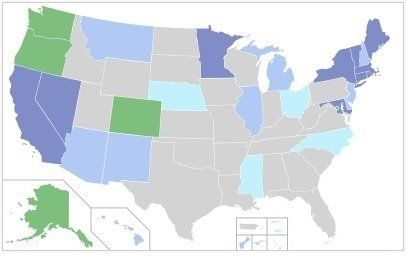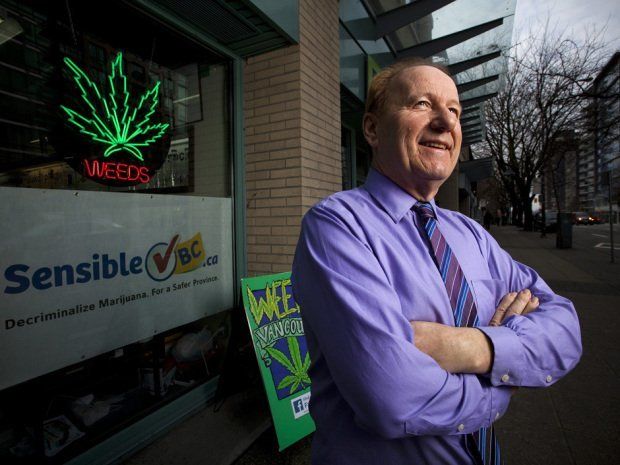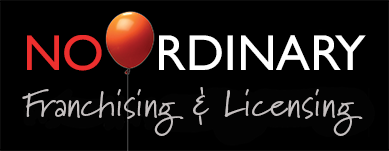Not that long ago in the United States you could be put away for possession and sale of marijuana for almost as long as first-degree murder. But today, decriminalisation of the drug in several states has fired up a billion-dollar industry — with massive franchising potential.
Marijuana may still be a Schedule 1 Substance under US Federal Law, but more and more states have been decriminalising it, not only for medical use but — no doubt seeing an opportunity to turn a previously underground industry into a source of tax revenue — for commercial sale.

In Alaska, Colorado, and Washington, the possession and sale of marijuana is legal for both medical and non-medical use. Washington DC has legalised personal use but not commercial sale, and decriminalis- ation is pending in Oregon.
Map: Wikipedia
Not surprisingly, a hot new industry has sprung up in these states. Marijuana stores are sprouting up like liquor stores. With names like Cannabis City and Medicine Man, some even offer specials and “happy hours” to bring in customers.
But in an industry that remains fraught with legal and compliance issues — even where it has been legalised — is marijuana retail franchising likely to take off?
You bet. I ran a Google search of “marijuana franchise” that turned up pages of franchise opportunities and articles about the proliferation of marijuana franchising.

The Georgia Sentinel predicted a “green rush” reaching nearly $9 billion in sales within the next five years. In Washington State, aptly-named pot pioneer Sean Green was taking his small retail operation to a higher level by selling licenses — his lawyer had warned to be careful about calling them franchises just yet. The “Walmart of Weed”, as hydroponics franchisor weGrow was dubbed the by CNN, saw itself as providing the necessary tools to pioneers of the “green rush” — just as suppliers of picks and axes did during the gold rush. A 21,000 square-foot (2,000 square-metre) franchised weGrow superstore had just gone up in sunny Phoenix, Arizona. A weGrow franchisee had recently put down roots with a smaller store in America’s capital city.
Marijuana franchising is just about to get its own TV show. The CNN series 'High Profits' will follow the progress of two visionaries, Cannabis Club owners Brian Rogers and Caitlin McGuire, with a unique plan — to franchise marijuana.
A surprising pop-up in our Google search was Weed Man, a lawn care franchise which was established in 1996. Had the franchisor decided that weed retailing was more lucrative than weed eating? No, it was simply the name that had caused the confusion.
Franchisors may be fired up about the marijuana opportunity, but it's not all plain sailing. They still have to overcome roadblocks you would not normally expect to face as a franchisor, most stemming from the conflict between U.S. Federal Law (which still classes marijuana as a prohibited drug) and different State Laws. This raises a number of thorny questions, such as:
Does an attorney providing legal advice to a marijuana franchisor or franchisee client about its business venture lose attorney-client privilege under the “crime-fraud” exception which does not protect attorney-client communications about the perpetration of a crime because the whole business itself violates federal law?
What risks are disclosed in the Disclosure Document and what happens if the Operations Manual conflicts with law?
What are the federal tax implications? Can a marijuana franchise deduct business expenses when the tax code prohibits costs related to trafficking controlled substances?
Another major issue is security. Because of the Federal/State Law conflict, banks won’t allow marijuana retailers to open accounts. That means these retailers can't accept EFTPOS and credit card payments for marijuana and related products. To cap it all off, state governments demand a 31.9% tax on all marijuana sales, but won’t accept cash.
In an effort to get around the problem, Theran Snyder of marijuana retailer Kine Mine in Colorado, the first state to legalise recreational marijuana, takes his tax money to the only state department that will accept cash — the Department of Motor Vehicles. Every month he uses a different vehicle and picks a different time of day, and he’s met at the DMV by an armed guard.
“It’s not easy money,” Snyder told The Franchise Times. “I’m telling you some big figures, but I sleep two hours a night, with a shotgun. I have cameras all over my house and property. I make sure I’m locked and loaded at night.”
From a franchise management point-of-view, this issue must raise some dilemmas for marijuana retailing franchisors:
How would you monitor your franchisees’ sales so you can be sure you’re receiving the correct royalty every month?
If your franchisees are located some way from you geographically, how would they get the royalty cash to you?
And the classic gangster’s dilemma: What would you do with all that cash if you can’t put it into the bank?
My name is Robin La Pere of No Ordinary Consultants and although I have worked in the franchising industry for many years, I have never been involved with a marijuana franchise—mainly because openly selling the drug is still illegal in New Zealand, where I am based.
However, I find it interesting how much and how rapidly the world is changing—especially in the United States where 20-year sentences for selling marijuana were commonplace 20 years ago. It's also interesting how franchising is adapting to the new world.
Relevant Articles
A major strength of franchising is that it’s based on tried and true business models. Trouble is, in this fast-changing business environment, what’s tried and true one year may be tired or irrelevant the next.
Not surprisingly, one out of three franchisors is concerned about the viability of their business model.
The 'Business Model Canvas' has emerged as a powerful tool for developing and updating business models. Recognising that franchise businesses differ in several ways from other business types, I have come up with a new version of the Business Model Canvas designed specifically for franchises.
Send me your email and I'll email you my e-book The Business Model Canvas for Franchisors:




